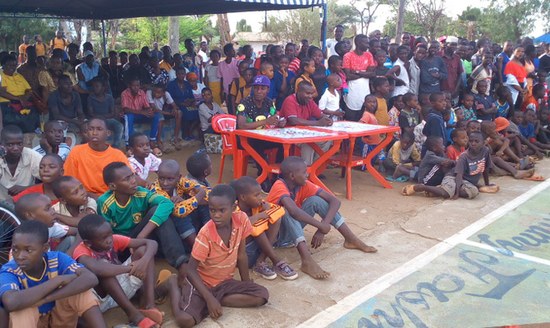 Francesca takes her place at the center of a small basketball court, where about twenty colleagues await her from the Ngokolo health center, where she has been working since the start of the year. She recognizes Director Katambi, with his impressive stature and good-natured eyes, the nurses who follow her on her rounds every day, the administrators, the pharmacy employees, and the Muslim workers who give patients support and comfort. None of them is wearing the work uniform today. Today’s outfit is dark pants or skirts and a colourful t-shirt with the logo of “Test and Treat”, the Doctors with Africa CUAMM’s project against HIV in Tanzania. It’s a special occasion: the Shinyanga city government organized a musical event for the public, and as, fortunately, happens more and more, they chose to invite CUAMM workers so they can give HIV tests to the many young people in attendance.
Francesca takes her place at the center of a small basketball court, where about twenty colleagues await her from the Ngokolo health center, where she has been working since the start of the year. She recognizes Director Katambi, with his impressive stature and good-natured eyes, the nurses who follow her on her rounds every day, the administrators, the pharmacy employees, and the Muslim workers who give patients support and comfort. None of them is wearing the work uniform today. Today’s outfit is dark pants or skirts and a colourful t-shirt with the logo of “Test and Treat”, the Doctors with Africa CUAMM’s project against HIV in Tanzania. It’s a special occasion: the Shinyanga city government organized a musical event for the public, and as, fortunately, happens more and more, they chose to invite CUAMM workers so they can give HIV tests to the many young people in attendance.
For the entire ten days of the event, a CUAMM gazebo is set up on the side of the basketball court and trained CUAMM workers invite people to get tested and give them information about how to avoid contracting and spreading the virus.
But Francesca and her colleagues are here today for another reason. They have decided to form a choir and take part in the event, leaving the health center for a few hours to get out among the people. Being in direct contact with people also helps counteract the distrust that often keeps people far from health facilities.
Before their performance, a group put on a breakdance show; this is the most popular kind of dance among youth and the many people lining the court are thrilled. Young people and adults are standing, sitting on the ground or and leaning against bikes. They are having fun, watching curiously, chatting, and, most importantly, they are glad to get tested.
Arianna Bortolani, in a double role today as the project manager for Test and Treat and as contralto in the chorus, says “Raising awareness among young people is key. Young people start having sexual relations very early, and because they are healthy, they are less likely to go to health facilities, to get tested and to learn the basic rules. This puts them at risk of catching and spreading the virus; they are our main focus.”
By the end of the event, CUAMM tested 258 people, 20% of whom were adolescents. Only six people tested positive, three men and three women. And none were adolescents.
There is still a long way to go. In 2017 CUAMM has launched a dedicated 5 years project in the regions of Shinyanga (HIV prevalence 5.9%) and Simiyu (HIV prevalence 3.9%) to provide free care and treatment for HIV, introducing the Test&Treat approach, as suggested by WHO guidelines The previous approach to the disease did not suggest immediate treatment for HIV-infected patients. Indeed, only those whose CD4 blood count was below 350 cells/mm3 received antiretroviral therapy. Due to geographical distances, the possible worsening of the disease and social stigma, there was major risk for the patient to get “lost”, and an even greater one to transmit the disease to others. The new Test and Treat approach recommends free HIV test and treatment to all those resulted positive. The project aims to test 300,000 people in five years and it involves hospitals, health centers and local communities in a continuum of care. It aims to decentralize HIV services from hospitals to primary care facilities and to shift tasks from doctors to nurses and community health workers. Indeed, moving from health facilities to a community-based model, should make it easier to reach and manage patients that live in peripheral and more isolated areas. In order to reach as many people as possible, project activities include testing campaigns in health centers; testing campaigns in villages, schools, working places, worship places and local events; and sensitisation campaigns through radio, TV and SMS to raise awareness on the topic, reduce stigma, advertise testing and provide useful information. The tight-knit, dynamic staff includes local and international workers always ready to organize and take part in local events, committed to reaching a goal that, though still far, is possible.
……….
Contribution by Doctors with Africa CUAMM to the Annual Report 2017 of the MMI Network
More information (in Italian language): https://www.mediciconlafrica.org/blog/la-nostra-voce/news/test-treat-lancio-del-progetto-per-le-regioni-di-shinyanga-e-simiyu/
